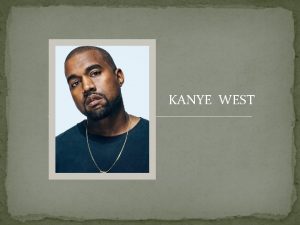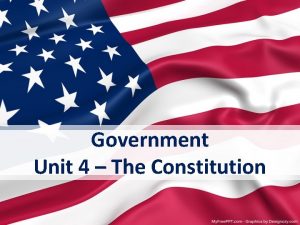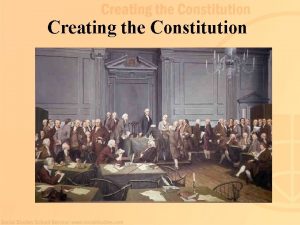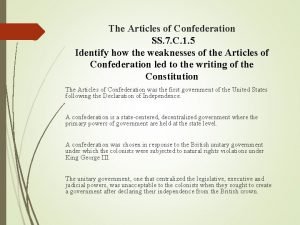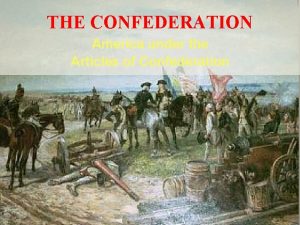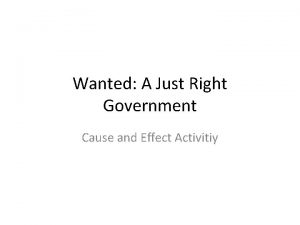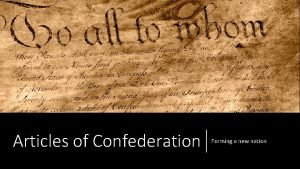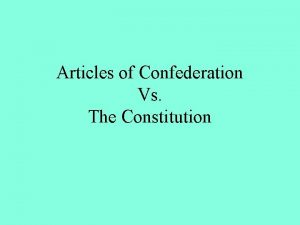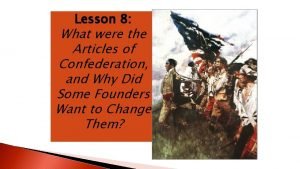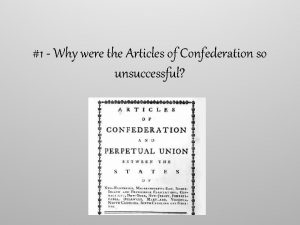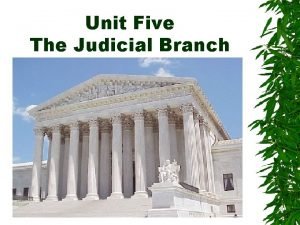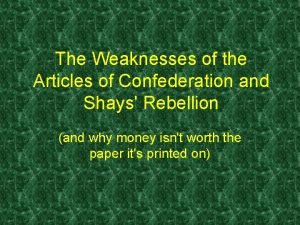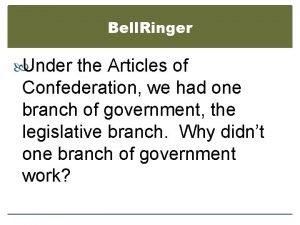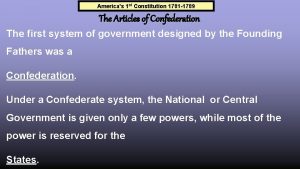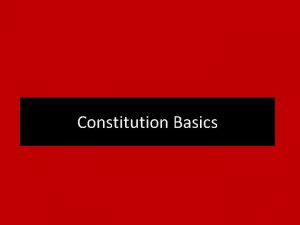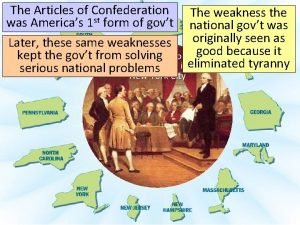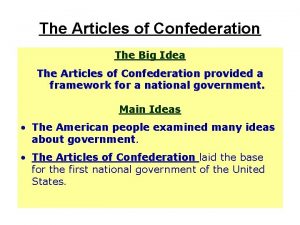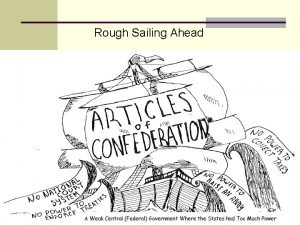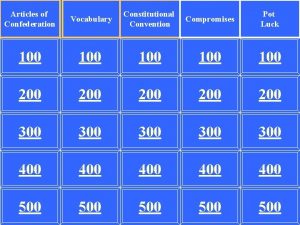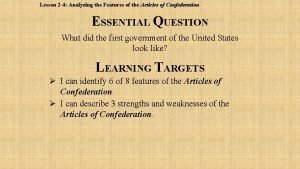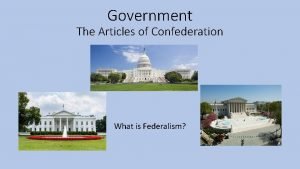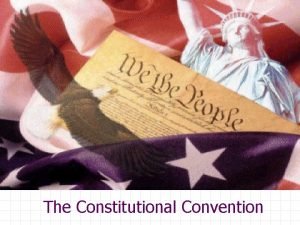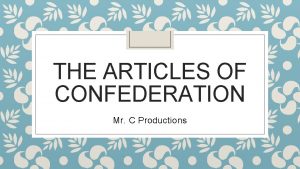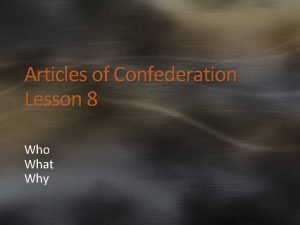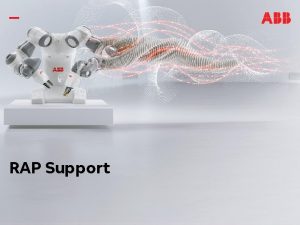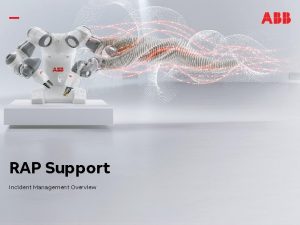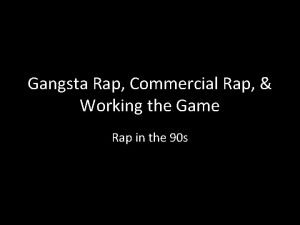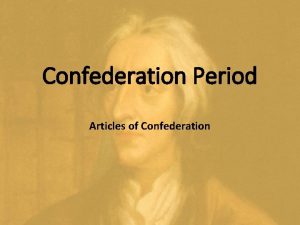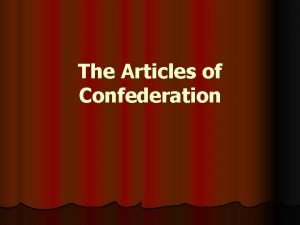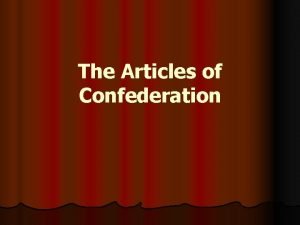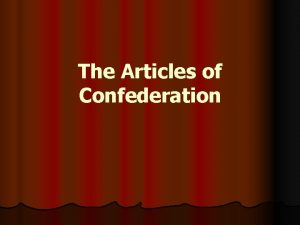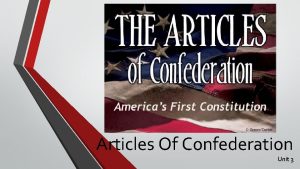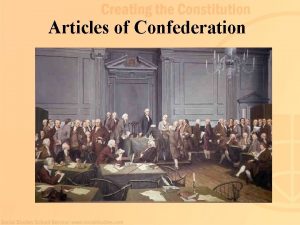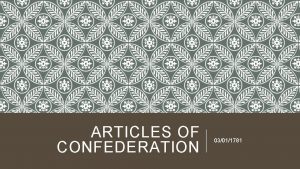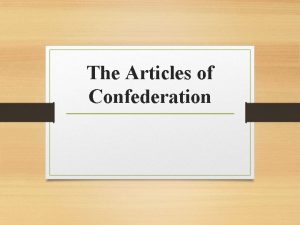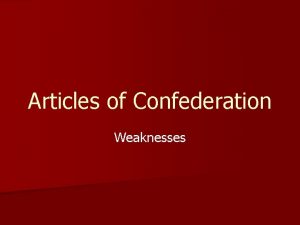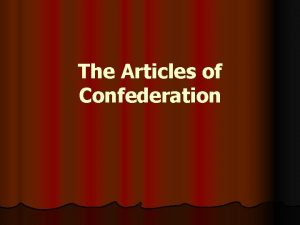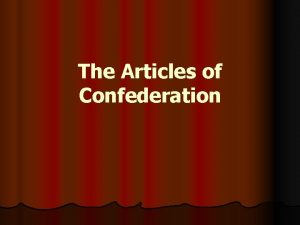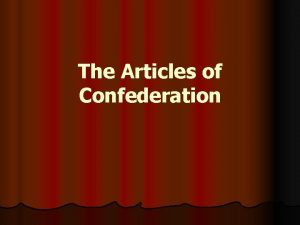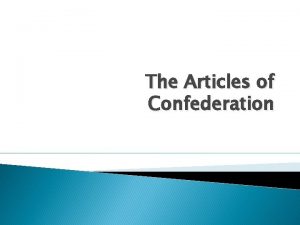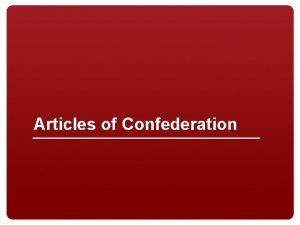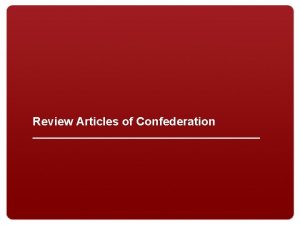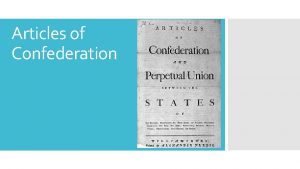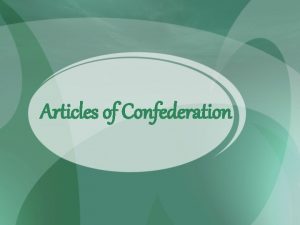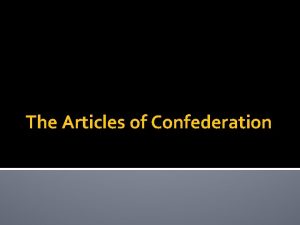THE ARTICLES OF CONFEDERATION Articles of Confederation Rap

























- Slides: 25

THE ARTICLES OF CONFEDERATION

Articles of Confederation Rap C to the ON to the F, E, D E to the R to the A and T I, O, N- Let’s begin To learn the Articles of Confederation But oh no! Got some problems! And we need a way to solve ‘em See, this government’s too weak Yeah, we got some things to tweak With a bang and a pow Beat the British, but now We require a government to oversee things somehow They can’t tax, Can’t run trade Can’t make sure that they get paid If the states don’t like their plan They can toss it in the can Make it strong? Heck no! State Rights has gotta flow Keepin’ everybody equal It’s the Constitution’s prequel So the Feds, what can they do? Raise an Army, navy too Start a War, Make a Treaty, Keep our Postal Service speedy, Mint some Coins, Print a dolla Deal with Injuns if they holla Yeah, we keep their powers small So the States can hold the ball So it’s time to try again Constitution time, my friend Meet in Philly, cuz you know Articles have gotta go!

n The Articles of Confederation was our first constitution n A constitution is a plan for a national (or federal) government n A confederation is a loose union of states

Handling our fears n Our Founding Fathers had 3 main concerns as they created this 1 st government 1. The federal govt. having too much power 2. Large states having more power than smaller states 3. How to handle disputes between states over western lands

How they handled these concerns: To control federal power, the govt. was deliberately made weak (very limited powers) 2. To keep large states from dominating, each state had 1 vote in Congress 1. – In addition, laws required 9 out of 13 states to agree in order to pass Federal Govt.

3. To deal with the land disputes, each state had to give up its claim and all western lands became property of the federal government n The Articles were not ratified (approved) until these concerns were addressed. n

Powers of the Federal Govt. n 1. 2. 3. 4. 5. 6. n The powers of the Federal government were basically limited to 6 things Create an army & navy Declare war Make treaties with other countries Create a Postal Service Coin money Make treaties with Indian tribes All other powers went to the states (who could also coin $, deal with foreign nations, and declare war)

It didn’t take long to recognize the many weaknesses of The Articles of Confed. n 1. The Fed. Govt. had no power to tax, so it could only ask for $ to fund things, rather than automatically receive it – -With no power to tax, it was hard to pay off our many debts n 2. The Feds had no power to regulate trade between states or with other countries – - This meant that states could levy tariffs on goods passing through. This was counterproductive to efficient trade across state lines.

n n n 3. States could blow off any act of Congress they disagreed with. Nothing could be enforced 4. It was hard to pass any laws with the 9 out of 13 states requirement 5. States being able to coin $ and declare war created confusion and made the federal govt. seem even more wimpy. X X

Philadelphia Convention n The States agreed to meet in Philadelphia in 1787 to amend the Articles, but ended up scrapping it and creating a whole new constitution.

Articles of Confederation Rap C to the ON to the F, E, D E to the R to the A and T I, O, N- Let’s begin To learn the Articles of Confederation But oh no! Got some problems! And we need a way to solve ‘em See, this government’s too weak Yeah, we got some things to tweak With a bang and a pow Beat the British, but now We require a government to oversee things somehow They can’t tax, Can’t run trade Can’t make sure that they get paid If the states don’t like their plan They can toss it in the can Make it strong? Heck no! State Rights has gotta flow Keepin’ everybody equal It’s the Constitution’s prequel So the Feds, what can they do? Raise an Army, navy too Start a War, Make a Treaty, Keep our Postal Service speedy, Mint some Coins, Print a dolla Deal with Injuns if they holla Yeah, we keep their powers small So the States can hold the ball So it’s time to try again Constitution time, my friend Meet in Philly, cuz you know Articles have gotta go!


Confederation Dilemmas n We have already learned about many of the weaknesses of the federal government due to the way the Articles of Confederation were written. n But the Confederation Congress had more than just frustration over taxes and states’ rights to deal with. They also had some major foreign policy headaches to deal with!

Problems with Britain n We were upset with Britain because they still had troops stationed in forts out West that were supposed to have headed home after the war (they said it was o. k. because they could trap furs to pay off debts we still owed them.

n Britain was upset with us because they did not feel we were treating Loyalists very well (which we weren’t).

n Without the protection of the British Navy anymore, many of our ships were being stopped or taken by both British vessels as well as the Barbary Pirates in the Mediterranean.

Problems with France and The Netherlands n We owed them both a lot of money and couldn’t even pay the interest on our loans.

Problems with Spain was paranoid that we would expand into their territory, so they were getting the Indians to attack us. n Also, they controlled the city of New Orleans at the end of the Mississippi River, and made us pay very high fees to be able to store our goods there until our ships could transport them overseas n This is known as the right of deposit n

Shays’ Rebellion At home, people were also disrespecting our government. n Massachusetts was trying to pay off all its debts, so it had to raise its taxes. n Many farmers became angry because it happened to be a bad season for growing, so many of them were going bankrupt. n

A Continental Army veteran named Daniel Shays led a rebellion of farmers against Boston. n Many people in Boston (and around the country) began to panic. n State troops were able to stop the mob after some rich Bostonians raised their own little militia to fight them off. n

Recognizing Weaknesses n Shays’ Rebellion convinced many Americans that our government was way too weak – It wasn’t even powerful enough to deal with angry farmers! n Delegates from the states met in Philadelphia in 1787 to try to amend the Articles and make them stronger. This meeting was known as the Philadelphia Convention (aka The Constitutional Convention)

The Constitutional Convention n At first, not many states showed up in Philadelphia, but eventually 12 of the 13 had representatives there 55 delegates total – Rhode Island didn’t attend because they were worried that the convention would create a new constitution that would give too much power to the national government. – As it turns out, this is exactly what would end up happening! n Independence Hall is the building in Philadelphia where both the Constitution and the Declaration of Independence were signed

n The discussions were done in secret so that everyone would feel free to speak their mind without fear of public criticism.

Major Names at the Convention It was a very wise and talented group that met in Philadelphia for the convention. Some of the significant people there were: n George Washington. The President of the Convention (of course) n James Madison. The “Father of the Constitution”He contributed more ideas than any other delegate. n George Mason. The preamble of the Constitution was based on one had done for VA’s constitution. n

Ben Franklin. He was easily the oldest delegate, and his sense of humor helped take the edge off (when he wasn’t busy sleeping) n Alexander Hamilton. He worked hard towards creating a much stronger federal government that could handle issues more easily. n Some of the big names from the Revolution were not part of the convention: Jefferson was over in Paris, Paine was in England, and people like John Hancock and Patrick Henry were seen as too radical. n
 Rap rap artinya
Rap rap artinya Articles of confederation vs constitution
Articles of confederation vs constitution Federalism in the constitution
Federalism in the constitution Weaknesses of the articles of confederation
Weaknesses of the articles of confederation Articles of confederation
Articles of confederation Icivics wanted a just right government
Icivics wanted a just right government Articles of confederation
Articles of confederation Constitution vs articles of confederation
Constitution vs articles of confederation Achievements of the articles of confederation
Achievements of the articles of confederation Why were the articles of confederation unsuccessful
Why were the articles of confederation unsuccessful Articles of confederation
Articles of confederation Articles of confederation strengths
Articles of confederation strengths Articles of confederation bell ringer
Articles of confederation bell ringer Achievements of the articles of confederation
Achievements of the articles of confederation Weaknesses of the articles of confederation
Weaknesses of the articles of confederation Strengths and weaknesses of the articles of confederation
Strengths and weaknesses of the articles of confederation Political weaknesses of the articles of confederation
Political weaknesses of the articles of confederation Legislative branch
Legislative branch 3 5ths compromise
3 5ths compromise What does rough sailing ahead mean
What does rough sailing ahead mean Articles of confederation vocabulary
Articles of confederation vocabulary Strengths of the articles of confederation
Strengths of the articles of confederation Articles of confederation fail
Articles of confederation fail When was the great compromise
When was the great compromise Articles of confederation
Articles of confederation Lesson 8 the articles of confederation
Lesson 8 the articles of confederation
